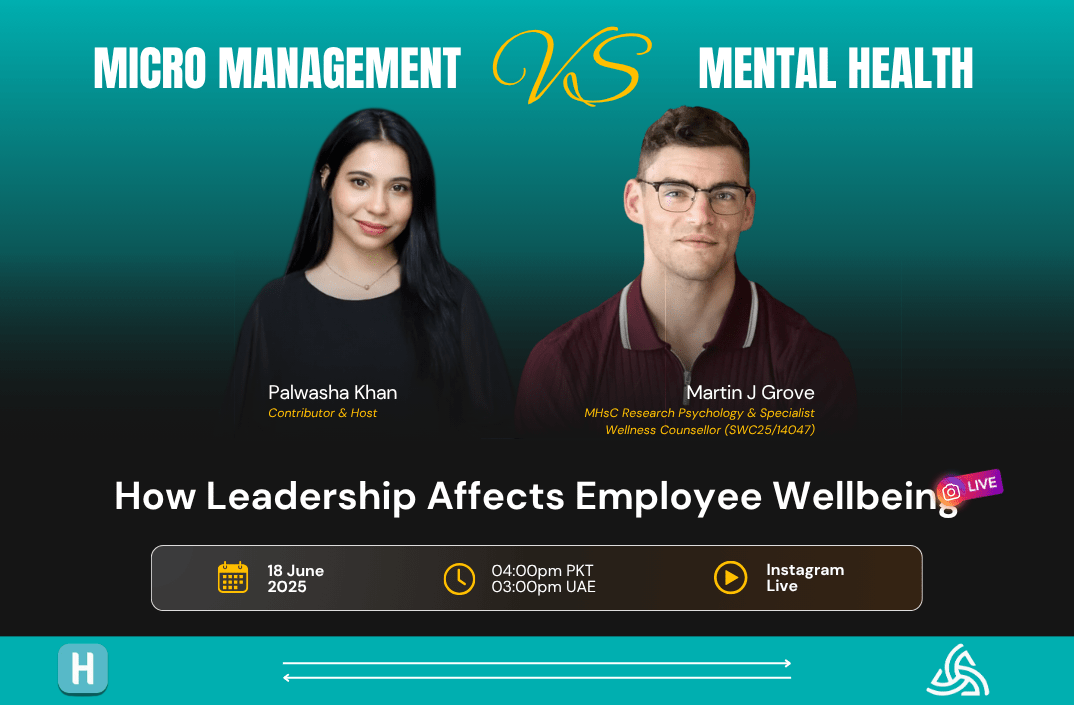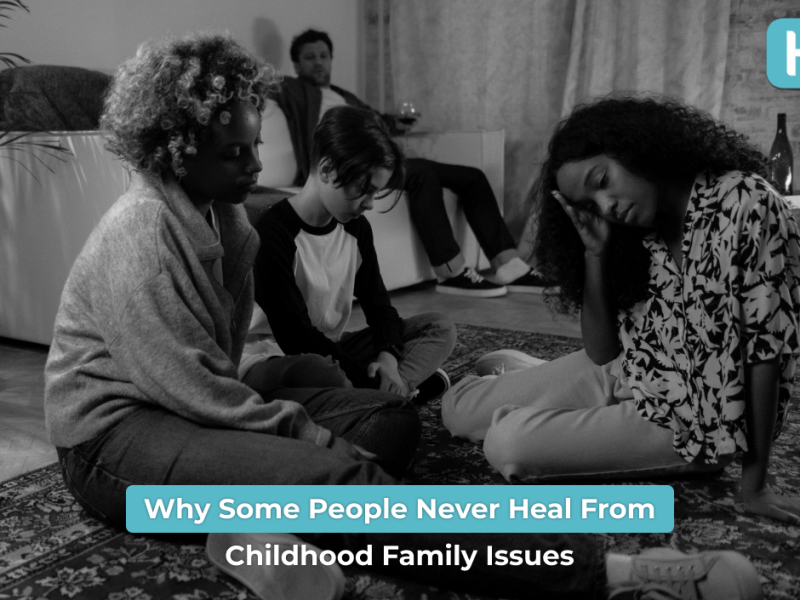If you joined us for our latest Helply Live session, thank you. If you missed our live session, you don’t need to worry, as everything we covered is available here. We discussed something that most people are familiar with but rarely discuss openly: micromanagement and its gradual impact on one’s mental state.
People talked about their stories, frustrations, cycles of burnout, and some surprisingly hopeful lessons.
A Powerful Session with Our Experts, Helply Live Recap
At Helply, we believe that conversations around mental wellness deserve both honesty and expertise. That’s precisely what unfolded during our recent Helply Live session, where we had the honor of hosting two incredible voices:
Martin J. Grove, a Research Psychologist and Specialist Wellness Counsellor, recently earned his MSc in Research Psychology. Martin brought deep academic insights and evidence-based perspectives on how micromanagement silently affects mental well-being. His calm, research-driven explanations helped break down complex mental health concepts into actionable takeaways for everyday workplaces.
Palwasha Khan, Director of Marketing at Prismatic Technologies, brought a fresh perspective to the conversation, blending branding insight with a content-driven approach. With over a decade of experience in content marketing, branding, and strategy, Palwasha shared how workplace culture and leadership narratives deeply influence employee mental health. Her perspective reminded us that mental wellness isn’t just a personal matter; it’s also about how we shape environments through the stories we tell and the strategies we implement.
Together, Martin and Palwasha sparked a conversation that was as thoughtful as it was relatable, balancing psychology, real-life stories, and leadership experiences.
What Is Micromanagement?
Micromanagement occurs when a supervisor or manager attempts to control every aspect of an employee’s work. Instead of trusting you to do your job, they constantly check on you, correct small things, and rarely give you the freedom to make your own decisions.
It might look like:
- Asking for updates every hour
- Rewriting your emails or presentations
- Telling you how to do even the most minor tasks
- Not letting you work independently
At first, it may seem like they want everything to be perfect, but over time, it starts to feel like they don’t trust you at all.
How Does Micromanagement Affect Your Mental Health?
Being micromanaged doesn’t just make work frustrating; it can affect your mental health in profound ways.
When someone watches over your shoulder all the time, it can make you feel:
- Anxious: You’re always worried about being judged or doing something “wrong.”
- Stressed out: It feels like you can’t catch a break or even breathe at work.
- Low in confidence: You start to doubt your skills, even if you were once confident
- Unmotivated: When your ideas don’t matter, you stop trying
- Burned out: You feel tired, emotionally drained, and disconnected
One person from our Helply Live said it perfectly:
“It’s like I’m doing the job, but I’m not trusted to own it. That’s exhausting.”
Micromanagement creates a work environment where people feel small, unheard, and constantly under pressure. It doesn’t just slow down work; it slowly erodes mental and emotional well-being.
Whether you’re feeling suffocated by micromanagement or trying to break old habits as a manager, this recap will resonate with you. Here are the five biggest takeaways from the conversation.
1. Micromanagement Is Not Just Annoying, It’s Emotionally Draining
Most people don’t leave bad jobs; they leave bad managers.
We heard it loud and clear from the audience during the live. Micromanagement isn’t just about checking in all the time; it’s about what those check-ins really say. At its core, it’s a lack of trust. It sends the unspoken message: “I’m not sure you can handle this.” And that can quietly chip away at confidence and morale.
That kind of environment slowly affects your confidence. You stop taking the initiative. You question every move. You feel like you’ve done nothing, even though you finished everything on time.
Someone in the comments said it best:
“I used to love my work. Now I feel scared; I’m always disappointing someone.”
That really hits home. It’s not just something one person goes through , it’s a struggle most corporate employees silently deal with every day. When a workplace focuses more on control than trust and teamwork, it slowly kills creativity, drains motivation, and takes a toll on mental health.
Micromanagement doesn’t shout, but its quiet lack of trust wears you down over time.
2. Micromanagers Are Often Burnt-Out Themselves
Here’s something we didn’t expect: a lot of people watching were managers. And they weren’t just defending micromanagement; they were explaining it.
Many of the managers were just as overwhelmed as their teams
They feel pressure from higher-ups. They’re terrified of failure. And many said they never had healthy management modeled for them in the first place.
That doesn’t make it okay, but it does make it human.
One manager admitted:
“I micromanage because I’m scared of things falling apart. I thought if I stayed in control, we’d all be safer. But it’s making everyone, including me, miserable.”
That moment shifted everything. It reminded us that compassion isn’t a one-way street. While it’s easy to label micromanagers as controlling or harsh, the truth is that they might be acting out of their own fear, stress, or lack of support.
Mental health and support are crucial for everyone, including managers.
3. Mental Health Doesn’t Stand a Chance in Fear-Based Cultures
You can’t discuss micromanagement without addressing the culture that enables it. When workplaces prize perfection over progress, speed over sustainability, and control over trust, mental health suffers.
One participant said:
“We have wellness webinars every Friday, but I’m still afraid to take a day off. What’s the point?”
That one had all of us nodding.
Here’s the real issue: Burnout won’t go away with just wellness talks and office perks. If the system keeps employees in a constant state of fear of making mistakes or being watched, no amount of meditation apps will help.
What we need is absolute safety and emotional safety. The kind where you’re allowed to say:
- “I need help.”
- “I don’t know.”
- “I need a break.”
- “I’ve got this, please trust me.”
Without fear of being punished or sidelined.
4. Trust Is the Best Mental Health Policy (and the Cheapest)
When asked what helped them recover from burnout or bad management, people didn’t say “a pay raise” or “a ping-pong table.” They said one word: trust.
Trust means:
- Letting people own their work
- Focusing on outcomes, not check-ins
- Believing your team is capable, even if they do things differently
One person shared:
“The first time my manager said, ‘I trust your judgment, go ahead and decide,’ I cried after the call. It was the first time in years I felt like an adult at work.”
We all felt that.
Trust costs nothing, but what you get back is huge: better results, a calmer team, and absolute dedication.
And yes, stronger mental health across the board.
Managers: try it. Step back. See what happens when you let people lead.
5. Change Starts Small, One Bave Conver action at a Time
Let’s be honest: you’re not going to rewrite your company’s management style overnight. You might not even be able to get your manager to change.
But here’s what you can do:
Speak up gently, firmly, and honestly.
Talk about it if micromanagement is affecting your mental health. Start with:
“I appreciate your support, but I do my best work when I feel trusted. We try a more independent setup and check in weekly?”
If you’re a manager who realizes you’ve been micromanaging, try saying:
“I realized I might be over-checking things. I trust you; let’s try giving you more space this week and see how it goes.”
- Is it awkward? Yes.
- Is it brave? Absolutely.
- Will it make things better? One conversation at a time, yes.
Real change begins when we stop hiding behind faces and engage in meaningful conversations. That’s how workplaces learn and move forward.
Let’s Build Trust, Not Tension
Micromanagement is more than a control issue; it’s a mental health issue.
It steals confidence. It breeds fear. It drains passion.
But it’s not permanent. Micromanagement doesn’t prevent chaos; it replaces trust. That’s the real problem. Trust is the seed for freedom, creativity, and emotional well-being.
At Helply, we’re not just here to vent problems. We strive to cultivate a constructive work environment through open communication, honesty, and courage.
So, whether you’re an employee or a supervisor seeking to turn things around, take a breath. Change doesn’t need to be big or perfect; it just needs to be art.
Sometimes, simple words will do:
“I hear you. I trust you. I’ve got your back.”
FAQs:
Q: Are there situations where micromanagement is helpful?
A: A little short-term micromanagement may be helpful for a couple of days to weeks, for example, during the onboarding experience or a short crisis episode. Micromanagement can break morale, cause stress, chip away at confidence, erode self-confidence, and open the door to burnout. In other words, you are to help nurture your team, not choke them.
Q: So, how can you tell if someone is micromanaging you?
A: If you’re constantly being watched or second-guessed,even when doing well,that’s a clear sign of micromanagement, particularly when you know and are delivering results. The missing significant ingredient is trust.
Q: How can I stop micromanaging as a manager without feeling like I’m losing touch with my team?
A: Start small: Set clear goals, give people ownership, and check in,not hover. More importantly, let the results speak for themselves!
Q: As a manager, how can I stop micromanaging without feeling out of control?
A: Start small: Set clear goals, hand over the work, and plan weekly check-ins, not constant follow-ups. Let results do the talking.
Q: What mental health signs show that someone is micromanaging a team?
A: Burnout, disengagement, anxiety, diminished creativity, and persistent self-doubt are markers. If your team feels mentally drained, something is going on.
Q: How does Helply support the development of company leadership through wellness initiatives?
A: We offer live coaching, real-time training, and toolkits that focus on emotional intelligence, team dynamics, and trust-building. It’s not fluff. It’s a real help for real humans.


